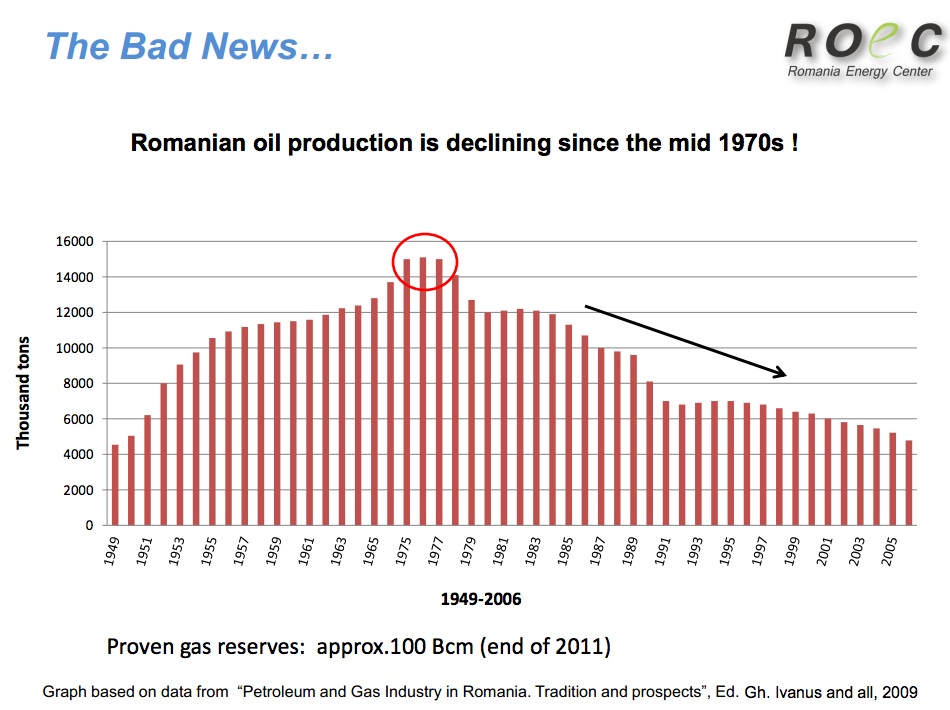Romania may not have any choice but to allow hydraulic fracturing (fracturare hidraulice), according to a report by the Romania Energy Center![]() . We’ve been studying Romania’s situation over natural gas, and proposals to frack that country’s shale deposits, as a way of learning about the overall story of fracking.
. We’ve been studying Romania’s situation over natural gas, and proposals to frack that country’s shale deposits, as a way of learning about the overall story of fracking.
The papers I’ve read this evening were delivered by the ROEC to various conferences over the last two years. The ROEC is an english language think tank focusing on oil, natural gas, and “energy” policy in Romania. As an industry think tank we can expect their work to be biased towards the oil and gas industry. However, some of what they’re reporting does paint a dire picture for Romania’s future unless some big change is made in that country’s energy resources.
I’d rather see Romania embrace renewable energy resources, but the tried-and-true for over a hundred years of modern economic development has been fossil fuels.
Romania is way past its peak of oil production, and domestic oil and gas production is declining at a 10% per year rate. It’s expected the country will simply run out of oil and gas to produce, via conventional methods, in 10-15 years.
Consider that it takes a LOOOOONG time, many YEARS, to start producing in new oil or gas fields. That means to avoid the looming problem, if their solution is more oil and gas then they’d better start drilling now.
If Romania doesn’t come up with a seriously big solution for new energy resources, they’ll become dependent on Russia. That’s the last thing Romania wants is to fall back under the dominance of Russia. It’s not just the Romanians that fear dependency on Russia, most of Europe does. It’s expected that if (when) Russia’s natural gas is the primary supply to Europe, that Russia will be able to extract huge economic dividends, and that Russia is salivating over those prospects.
Romania has identified three new sources of domestic oil and gas production.
Enhanced recovery techniques in existing fields.
Unconventional resources (fracking), which we’ve been covering a lot in recent posts. As we see in this slide, the ROEC can’t predict the outcome.
Off-shore deep-water resources in the Black Sea.
Those slides came from ROEC’s presentation in September 2013 at the Balkans Oil and Gas Conference in Athens![]() .
.
It’s also possible for Romania to secure an external source of natural gas and oil other than Russia. The country has been working hard on this, and pinned a lot of hope on the “Southern Gas Corridor” project. I’d written a fair amount about the Southern Gas Corridor project in an earlier post. The gist is that there’s plenty of natural gas deposits in Central Asia that aren’t under Russia’s control – today – because these various countries managed to escape from the U.S.S.R. when that country disintegrated. The Southern Gas Corridor aims to build a natural gas pipeline from the Caucasus, through Turkey, and into Europe. This would let Europe switch their dependency on Russian natural gas for Central Asian natural gas.
A strategy decision in the Summer of 2013 concerning the Southern Gas Corridor went in a direction that does not help Europe. “Nabucco” is the version of that project which would have supplied large quantities of natural gas to Europe. Instead a different plan was chosen, and because Romania had pinned their hopes on Nabucco the country is left scrambling for a replacement natural gas source.
Another possible resource is this new oil and gas discovery in the Mediterranean. This is years away from being exploited.
Those slides came from ROEC’s November 19, 2013 presentation at the Romania Oil And Gas Conference, 2013![]() .
.
The picture painted by these two presentations from ROEC is that in a few years Romania is going to face a big economic problem. Dwindling domestic oil and gas is going to force the country to increase imports, but that will put a drain on Romania’s economy, which is already weak.
As for the prospects of shale gas (fracking) as the solution, ROEC had this to say:
NAMR is Romania’s bureau of natural resources.
My vantage point is thousands of miles away, but having read dozens of Romanian news reports on this, this assessment seems apt. However, I don’t know that the public is being manipulated with misinformation. The anti-fracking writings I see in Romania seem to be well informed of the risks. The people involved are strongly convinced they do not want fracking to take hold in Romania.
- Highway design could decrease death and injury risk, if “we” chose smarter designs - March 28, 2015
- GM really did trademark “range anxiety”, only later to abandon that mark - March 25, 2015
- US Government releases new regulations on hydraulic fracturing, that some call “toothless” - March 20, 2015
- Tesla Motors magic pill to solve range anxiety doesn’t quite instill range confidence - March 19, 2015
- Update on Galena IL oil train – 21 cars involved, which were the supposedly safer CP1232 design - March 7, 2015
- Another oil bomb train – why are they shipping crude oil by train? – Symptoms of fossil fuel addiction - March 6, 2015
- Chevron relinquishes fracking in Romania, as part of broader pull-out from Eastern European fracking operations - February 22, 2015
- Answer anti- electric car articles with truth and pride – truth outshines all distortions - February 19, 2015
- Apple taking big risk on developing a car? Please, Apple, don’t go there! - February 16, 2015
- Toyota, Nissan, Honda working on Japanese fuel cell infrastructure for Japanese government - February 12, 2015




















